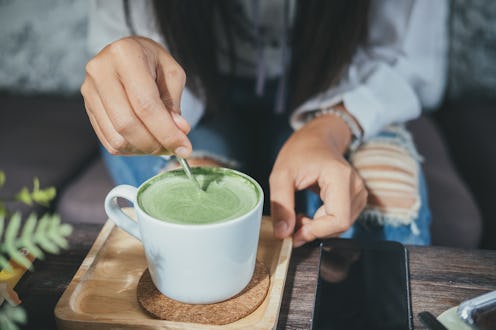
Oh, the joys of matcha green tea. As a true caffeine lover (read: addict) who unfortunately doesn't fare too well on coffee, matcha is my savior. It's highly caffeinated, makes a great latte (which is a more satisfying coffee replacement than regular hot tea, IMO), and it tastes great, too. Plus, we know the health benefits of matcha are super real — this stuff is full of cancer-fighting antioxidants, anti-aging polyphenols, and anxiety-reducing L-theanine. But in our collective quest to live more sustainably, it's important to find out: Is matcha environmentally friendly? It's certainly touted as a magical superfood, but how does its growth and production impact the environment?
Thankfully, matcha appears to a relatively sustainable caffeinated beverages — so matcha lovers, feel free to hug your warm mugs even tighter today. This hearty, earthy-tasting tea, which is traditionally grown in the shade, is made by grinding whole tencha green tea leaves into a fine powder — which you can then purchase and whisk into warm water at home. That's matcha!
"Because matcha is the only kind of tea that uses the entire leaf, it offers health benefits and environmental advantages that other varieties of tea do not," shared Matcha Tea on its site. "A typical tea plant that is used to produce matcha can live for a half-century or more, making it one of the most sustainable and environmental food crops in existence." By using the whole leaf, matcha requires less waste than other types of tea (which only use part of the leaf). Additionally, because tea only requires harvesting a plant's leaves, growers get a lot of longevity out of a single plant — making teas of all kinds (but especially matcha!) a pretty sustainable choice.
It's also important to look at the environmental impact of matcha relative to alternative beverages, too. Take coffee, for example, which is decidedly not one of the most environmentally-friendly morning rituals. It reportedly takes 37 gallons of water to produce a single cup of coffee, which is the equivalent of a whole shower — and in our drought-ridden modern day world, that's no bueno. Coffee crops apparently also often use harmful pesticides and chemicals, which can seep into waterways and cause pollution and environmental destruction.
But of course, not all matcha is made equally, and it takes some conscious effort to make sustainable choices. Just like any food item that's commercially produced, there are some companies producing matcha that certainly don't appear to keep the environment in mind as far as growing practices or pesticide use goes. "Compared with most other kinds of crops, tea can be among the most earth-friendly of all," explained Matcha Tea on its site. "Much depends, however, on the ways in which the growers deal with such issues as crop rotation, processing and sustainable business practices."
What you also need to remember when it comes to matcha lattes in particular is how environmentally the milk you use is. While the classic combo of matcha and almond milk is delicious, almond milk actually has a pretty big environmental footprint, thanks to all the water almonds take to cultivate. Conventional dairy also carries a bit of a footprint, since raising cows produces a lot of greenhouse gases. By contrast, frothing your matcha with oat milk is a pretty low-impact choice.
A big part of this conversation really centers around us doing our own research as consumers and actively supporting companies that have environmentally sustainable practices. For example, when buying matcha powder, look for brands that are certified fair trade, organic, and that use sustainable agricultural practices. Also look for brands that use more sustainable types of packaging and avoid anything that includes wasteful single-use packets. Brands like Matcha Yu, for example, sell matcha powder in packaging that is eco-friendly and home compostable. A little internet sleuthing can go a long way!
And bonus side note: Buying matcha in bulk powder form is already a plus, as there are no tea bags needed (and as you probably know, some tea bags even come individually wrapped, which wastes even more resources). All in all, matcha for the win!